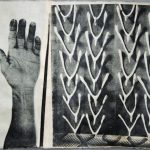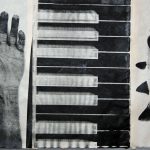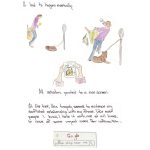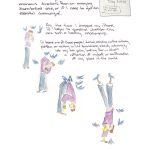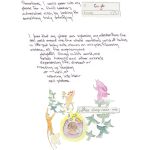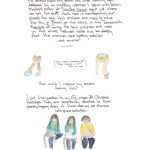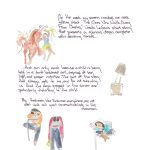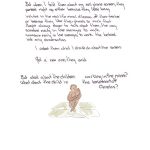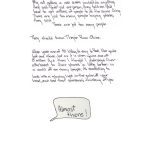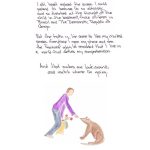Melissa’s mother was the first to spot Sonya in the ICU. She looked at Sonya like everyone back in Largo did, bouncing around her forehead and cheeks, connecting constellations instead of meeting her eyes. The older woman was more lined, fatter—a grandmother, for now—but still recognizable, standing guard outside the room. A whole room reserved for a baby the size of two cupped palms. Sonya remembered reading somewhere that they couldn’t rush new mothers out of the hospital, were legally required to let them stay, even for the stillborn.
Sonya’s skirt set stood out against the scrubs and denim-clad VA dwellers in the way she had always wanted to, but she felt garish amongst the multitude of reflective surfaces magnifying her face’s blistering peaks and craters. She tucked her pink nails into her palms.
“Sonya. I don’t know if you should have come,” Melissa’s mother said. “This is for family.”
Sonya privately agreed. She averted her eyes. There was a man in the hallway repeatedly ramming his wheelchair into the wall, humming to the tune of “Swing Low, Sweet Chariot.”
“I’m sorry.” Sonya shoved the terrible stuffed dog she had picked up for the baby into Melissa’s mother’s arms, wincing at its pinkness. “I’ll go.”
“Don’t be sorry,” a voice—sounding like sixteen, picking at garden salad in the lunchroom—said behind her as she turned to go, and boom, Sonya was back in high school. “You’re her Aunt Sonya. You should be here.”
—
Sonya heard the bad news about Melissa’s baby from her old high school’s secretary over a bin of Japanese sweet potatoes. The Whole Foods was new and out of place in Largo, both in budget and stature. Its skeleton loomed, folding over the Chicken Shack and DQ like some sort of brutalist God. She thought it would be safe to stop in, that no one she could have known from her childhood would be interested in green juices. She was wrong.
“Oh, honey, you’re home!”
The local high-school secretary, a bird-like woman with hair cut severely by the chin, dropped a pack of spiralized zucchini and pulled Sonya into an embrace. In the fluorescence of the vegetable section, her skin was cling wrap.
“I should have known,” she sniffed into Sonya’s collarbones. “You were always such a good friend to Melissa.”
Melissa was one of the neighborhood kids. Sonya had gone to school with her, grown up crawling under their desks during lockdown drills and pinning yellow ribbons to their spirit shirts. Melissa used to have two dogs and a brother in Iraq. Sonya was not in town to see Melissa. She hadn’t seen or spoken to Melissa for years.
Sonya was in town because her editor had sent her to do a piece on the opioid epidemic. Readers love a good tragedy, The Cincinnati Inquirer was rumored for a Pulitzer for its heroin article, and rural Florida provided a double whammy.
“Have you visited yet?” The secretary’s eyes were now leaking, and she attempted to wipe her dripping nose with her sleeve.
“No,” Sonya said, honestly. “I actually haven’t seen Melissa in . . .”
These encounters were always awful. She hated seeing people from home, hated the three-hour JetBlue flight, the drive to Largo in a rental car. Hated each cluster of mobile homes she passed, the lurch of pity upon seeing their dreadful names. Paradise Cove and Palm Valley and Dolphin’s Wave. The backs of the signs adorned with crude depictions of genitals and pentagrams and the number 666. The kids she grew up with: now strung-out cashiers and mothers and dealers- how she would have to fix her face so as to not to wear her pity.
She rubbed at her eyes. The secretary seemed to take this as an expression of grief, and reached out to touch her, managing to snag her silk blouse.
“I know, honey. It’s just so terrible. For it to happen to your best friend.”
Sonya had no idea what the woman was referring to, but she agreed. She called her mother while waiting in line with a pack of organic blueberries.
“Ma,” she asked, in place of a greeting. “What’s wrong with Melissa?”
—
Motherhood had softened Melissa’s already round figure, made her ruddier. She was wearing an XXL Tampa Bay Buccaneers shirt from their 2002 Superbowl win. Somewhere, Sonya had a matching shirt. It went down to Melissa’s knees, swallowing her baby weight.
“You’re her Aunt Sonya,” Melissa repeated, her voice very full. “We want you here.”
Sonya had no brothers or sisters. She knew she wasn’t an aunt now, would never be one—she was just a girl who had no one else to sit with in high school— so instead of speaking, she stepped into Melissa’s arms.
Over her shoulder, Sonya saw it, and tried not to scream.
Under an assortment of tubes and blankets, partially shielded by a monitor and surrounded by well-wishers who looked carefully at the floor, was a red and purple smear. A tube, running under the slits where nostrils go, was the only indication that it was breathing.
A man quickly blocked it from her view. She knew without looking at her hand that she had drawn blood.
“This her?” he asked.
Melissa released her.
“Sonya, Craig. My husband.”
Sonya once did a story on self-flagellation, reporting on a radical church that encouraged sanctioned beatings in preparation for adult baptisms. She had thought the practice to be barbaric—perverted even—the shivery way the pastor talked of pain, the way it overtook his face.
Craig, quite simply, looked mad. He looked like the radical Christians, had the jumpy sort of depravity in his eyes that made cops slow down at traffic stops.
“I’ve heard a lot about you. Glad you could come by to see Jay.”
Jay, Sonya realized, was the swaddled lump.
Sonya had no doubt that Craig didn’t want her there, or any of them. Craig wanted to be taking pictures of a pink lump of blankets for his terrible Facebook page. Craig wanted to take his weapon from base and execute them all into an open ditch. Craig wanted to be in a two-bedroom, reheating a Lean Cuisine he had let go cold while enraptured by the sight of his poor, scarred baby inhaling into his wife’s breasts.
—
Melissa wasn’t Sonya’s best friend. Melissa was pale, with a quick smile and cowhide hair that she got cut, short and boyish, at Fantastic Sam’s. She sat with her doughy legs spread and was always eager to show her overlapping teeth. In high school this outweighed her fantastic empathy, so no one spoke to her much.
No one spoke to Sonya either, because of her acne: rippling under her dark skin, cystic and mean. A teacher told her once in Geometry class, Have you tried putting toothpaste on it? in front of everyone, and only Melissa hadn’t laughed.
“That was wrong of her,” she had told Sonya seriously, after class.
“She’s a bitch. I can’t wait to get out of this shithole state.”
“She did something wrong.” The repetition sounded solemn, like a prayer.
Melissa had a strict sense of justice ingrained in her. She wouldn’t let Sonya copy her math homework and couldn’t wait to join the Navy. That’s what her family did.
“I want to be a Marine,” Melissa would smartly tell any adult who enquired.
“Better than selling Mitsubishis,” Sonya said, unsupportive. “Or meth.” These were the career prospects of many of their companions.
“Bad market for foreign cars,” Melissa mused, missing the point in her round-faced, agreeable way.
Melissa was soft while Sonya was angled, forgiving while Sonya taped a slice of deli ham in the locker of a boy who called her pizza face. The only thing they had in common was a love for rap. Melissa, sweet, pasty Melissa could drop bars. She had a collection of CDs living in the cab of her truck. Eminem and Dr. Dre and Wu Tang Clan and Jay-Z. They were a strict Pac family, didn’t own any Biggie. She knew every word on the Blueprint, could rap until the CD ejected. Sonya remembered that was the first time she admired Melissa for anything. Melissa kept them all in her truck’s glove box, along with her dad’s army knife, a birthday gift. For protection against perverts and coyotes, Melissa said seriously.
Their geometry teacher suffered from eight slashed tires that year, sixteen perfect puncture marks.
Melissa enlisted shortly after high school, and Sonya applied to Mizzou. There wasn’t really a need for each other, because Melissa had a new family and Sonya had an advice column, but every so often there would be a text or Facebook message, left to stagnate. A few years later, Sonya got a wedding announcement and a pregnancy announcement in the same stack of forwarded mail. That was just what you did in Largo.
Sonya couldn’t remember Melissa’s husband’s face, but knew he was also military. He had added Sonya on Facebook, where he inundated her timeline with racially-tinged articles from websites like “Truth for America,” all with headlines insisting that she should watch the liberal congressman get roasted by a ten-year-old boy-scout.
After the election, she blocked him, which was why she missed the Go Fund Me for their baby, and the message asking for her prayers.
—
“You should go pay your respects,” her mother had said, when Sonya returned with blueberries and unfounded guilt. “You’d be a comfort.”
Sonya’s mother belonged to the Advice Stitched on Pillows School of Thought. She wore her hair natural and made a big show of disapproving of Sonya’s silk press, reminded her how her oily hair would antagonize her skin. Wore her Walmart Greeter vest, McFlurry in one hand, always eager to spout the contents of a greeting card. She had loved earnest, ugly Melissa.
“I don’t know her anymore, Ma.”
“But she knows you, honey.”
“That doesn’t even make sense!”
Sonya scratched a scab. When she wasn’t writing or smoking, she was usually picking, collecting skin under her fingernails. Her mother would stare at the spots while she spoke to Sonya, would dart straight to her hands. Once, long ago, she had rubbed cayenne powder on them, in an attempt to stop Sonya from picking. It had sent her to the emergency room.
Her old bedroom was the front room of the trailer. It was originally a screened-in porch, but they had put up Plexiglas to mimic windows. You could hear coyotes at night.
She found her old cigar box, her hidey-hole, and smoked two ancient joints. Blew the smoke in the face of her mother’s terrier. Sonya refused to call it, to take it out, so that she wouldn’t have to say the name. She watched as the dog keeled over, tongue lolling, uncomfortably high.
The dog was called John, after Sonya’s father, who had left for another woman when Sonya was ten. Sonya’s mother, unfazed, went to the shelter, picked up the runt, named it after her ex-husband. Spent most of her days writing rambling letters to local judges and other semi-elected officials, demanding her husband pay his alimony.
Largo’s streets were laid out like an outstretched hand, mid-grasp. Sonya’s house rested on the tip of the pointer. The VA hospital sat on the thumb; to reach the drugstore you had to head toward the palm. She drove there, still baked, and found herself in the Hallmark aisle staring at the row of stuffed animals beseechingly, as if asking one to volunteer. She settled on the one with an unbearable face: a pink dog with cross eyes, one sewn lopsided, and drove to the hospital with it in her passenger seat, looking like a pitiful co-pilot.
—
Melissa spent the afternoon pointedly not looking at the mess of tubes, ignoring the padding of family members and stuffed animals, preferring to stare curiously at Sonya, as if she were the spectacle.
“How are you?” Melissa prodded, leading Sonya to a chair. Serene, like the pictures of Mary under the cross. Sonya stared at her, trying to detect fissures in her blankness. She found none.
“I’m so sorry, Melissa.”
“Working?”
Sonya wanted to hit her. Your baby, she wanted to scream. There’s something so wrong with your baby.
“Yeah. Can I get you a coffee or something?” Sonya asked wildly. “Let me bring you guys something. Craig?”
The baby mewled, and Craig recoiled as if she were a grease fire. There was a hitch in the beeping of the monitors, a collective wince.
“Can you get her something?” Melissa asked everyone and no one. “Something to make her sleep?”
Now, Sonya was beginning to understand better, beginning to crave a willow switch, the scarred backside. The self-flagellators had told her during the interview: The devil is inside you. He touched you, and they pointed at the scabs on her face. You need to beat him out.
“Little blue Jay,” Melissa’s mother said. Melissa jerked in response.
“Don’t call her that. That’s not her name. It’s Jay. Just Jay.”
Sonya raised her eyes from the tile, skipping over Jay-Just-Jay, and scanned the room.
No one knew but her that Melissa hadn’t named her baby after the bird. This made Sonya too guilty to breathe, too guilty to be inside herself. She went out into the hallway and everyone left her be: the nurses, the doctors, the men in wheelchairs with skin like candle wax.
—
It had happened before Sonya went to Mizzou. They had been hanging off Melissa’s bed. Melissa was longer, less round, the faintest hint of a tan on her chapped skin. Her hair just brushed the carpet. She hadn’t had to cut it yet. It must have been around the time she started Basic Training. Her last visit home. She turned to Sonya, grinned.
“I missed you,” she said. “I don’t get to hang out with any girls anymore.”
Sonya was struck by how eye contact was the same upside down as it was right-side up.
“Would you do me a favor?” Sonya said, remembering the tires. Melissa nodded.
“Punch me in the stomach.”
They were both quiet, then did that exchange girls can do with their eyes—Are you sure? How far? You weren’t safe?— all at once. Sonya dug her long, piano fingers into her hand, palms cut with thick fault lines.
“Please,” she said.
Melissa stood up, dismounted. Gravity had done this thing to her eyes that nighttime did to the neighbors’ lawns. She grabbed her car keys.
“Come on,” she said. Sonya followed.
Melissa handled the whole transaction. Filled in the papers. Swatted away Sonya’s hand when she offered to pay. Got her a diet Dr. Pepper, too.
In the aisle of the drugstore, Sonya washed it down. She wasn’t sure if this sort of thing allowed grieving, but Melissa put on Tupac on the way home, mouthing along— I was raised to be strong— and pretended Sonya was only hiccupping from the soda.
—
Sonya sat on the floor smelling her knees, thinking of the raw pink thing in the incubator, like a peeled crawfish. Somewhere in the wing, a self-playing piano started a rendition of “Amazing Grace.”
“Honey?”
The nurse had deep-set smile lines down her face, making canals to her chin. Her scrubs strained around her thighs as she squatted next to Sonya. They didn’t get many sick babies at the VA; the nurse must be used to men who demanded final cigarettes and asked for a peek of her panties.
“Honey, you’re gonna want to go back in.”
“No,” Sonya said. “I’m not even supposed to be here.”
She wiped herself with the hem of her shirt, all too aware of the bacteria she was spreading around her face, of the deep-rooted cysts stirring, hungry, in her cheeks.
The nurse stared at her, looked straight into her acne.
“The family is going to say goodbye.”
Sonya just shook her head, like a child. She had to leave. There was a chrome strip across from her that magnified the crustacean on her forehead, just above her eyebrow, that had been throbbing earlier in the day. While in the room, it must have erupted. She touched it, prepared for pus, and came away dry.
The nurse left, her sneakers chirping down the hallway. Someone else slid down next to her in the hallway. The Buccaneers jersey.
“Why are you here?” Melissa said.
I’m sorry I never stayed in touch. I’m sorry I wasn’t nicer growing up. I’m sorry my face looks like this. I’m sorry your baby looks like that. I’m mostly sorry because your baby looks like that.
“You took me to the clinic,” she said instead. “Summer after high school.”
She slumped a little, against Sonya. It was the first time she saw Melissa’s posture waver all day, saw her at sixteen again, pictured her fat and smiling.
“She was premature.”
Sonya knew a little about premature babies, assumed that the skin hadn’t developed for Melissa’s. That it was born raw. Without waiting for a response, Melissa rolled up her sleeve to the crook of her elbow.
“Look,” Melissa said. Sonya started.
“Fucking look.”
Under the baby weight and the buttermilk complexion, she hadn’t caught it. But in cloying hallway light she saw it: skin clinging to little bruises in the crease of her arm, veins thick and sagging, like telephone wires.
“Jesus,” Sonya breathed. “Melissa.”
Sonya raised her nails to her face on impulse.
“Don’t pick,” Melissa said absently. “It’ll scar.”
It wasn’t Craig that looked like the Evangelicals; no, that must have been a reflection. A strip of chrome. It was Melissa who was mad; Melissa who was rabid. Pupils tight and shiny, like the exoskeleton of a palmetto bug.
“Are you . . . now? In the hospital?”
“We’re going to do it,” Melissa said, as if that were an explanation. “Say goodbye.”
How could she have missed it? The eyes, the skin, all wrong. Not a pregnancy glow—a curtain of sweat. Withdrawal, sickly sweet. And guilt, guilt, guilt—whole body shaking like Plexiglas in a storm.
“Will you come?”
Did she have a choice?
—
Melissa’s mother took photos of it that would surely be posted on Facebook, all pink and shiny. It made Sonya want to hurl. Once, one of her mother’s dog had dragged in a squirrel, a plump thing, split at the seams, spilling maggots. It reminded her of that.
The nurse was posed in the corner, pressed up against the wall. You could only focus either slightly right or left of the carnage, most choosing to keep their brimming eyes on their sneakers.
Sonya stared at Melissa, noticed a tremor, a hand shaking like a screen door. An unfocus in her yellowed eyes. Craig clutched at his wife, and she became the space between his fingers. The nurse asked her a question, soft, and she bowed like a young birch. Sonya could have sworn the baby cracked what would have been an eye, stared at Sonya through the equipment, through the tubes: picking her out.
Sonya had collided her bike with a taxicab. She had passed kidney stones, watched her mother pass kidney stones. She had been slapped during sex. She remembered the big pad they had given her in the clinic for residual bleeding, like a diaper, the way she cramped for days after. Had seen pictures of children with legs blown off and women, branded, for their last names. But nothing like Melissa’s mother, thumb on the record button, as the parents each kissed the bundle on what would have been its forehead.
The nurse hummed. The beeping ceased. Craig drew away. Melissa didn’t remove her lips, stood hunched for a long time, over the gore, over the tubes, over what would have been the nose.
Sonya once saw a man jump in front of a train, saw him blast into pink mist—had to sit in the shower afterward for hours. She wondered all day, Had it hurt?— yes. This was worse.








